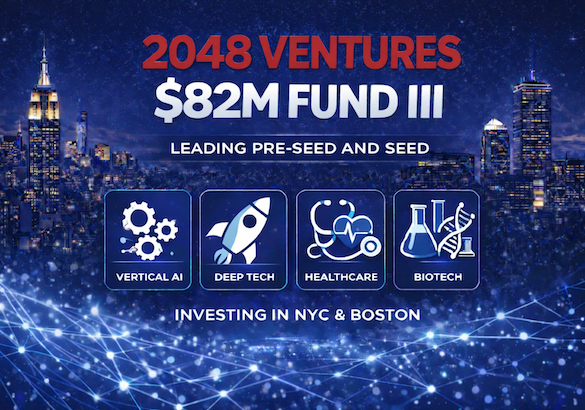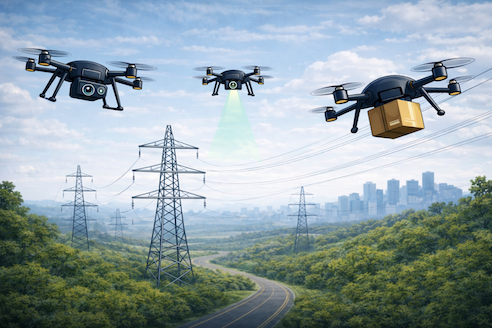Our Thesis on Digital Bioprocessing
By capturing unique data through existing bioprocess workflows and employing AI to fully reimagine these workflows, we can enhance the robustness and efficiency of biomanufacturing operations.

At 2048 Ventures, we are obsessed with the future and invest in the earliest-stage companies that establish defensibility through data and technology. Lately we have been thinking about the key role of data and technology in digital bioprocessing.
We are at the dawn of the Industry 4.0 era in bioprocessing, a time when digital technologies are set to revolutionize the efficiency and productivity of biological manufacturing. From bioreactor scale up to process monitoring and control, software systems and connected hardware are poised to enhance synchronization, automation, and monitoring across every phase of the bioproduction process.
Software interfaces that use AI and digital process simulations (or digital twins) require a robust data infrastructure layer to aid bioprocess development and optimization.
We believe there is an opportunity for solutions that can interconnect bioprocess data seamlessly:
- The rapid expansion of biomanufacturing (also emphasized by recent U.S. regulations and initiatives) requires efficient, scalable technologies to keep pace with the growing global demand for bio-based molecules.
- Automation and digital solutions have the potential to revolutionize bioprocessing operations. However, bioprocess data is complex in nature and needs to be integrated effectively across the entire bioprocess chain to fully unlock these technologies.
- There is perceived risk in digitizing large-scale systems from many incumbents. The value proposition must be strong for customers who have relied on established process knowledge and engineering principles. This calls for smart, incremental solutions that can integrate seamlessly without disrupting existing operations.
Customer Archetypes
We have identified three main customer segments:
- Services companies (CDMOs): serving the biotech and pharma industry.
- Biopharma companies: developing therapeutics and diagnostics. These are high-value products, typically using smaller commercial scale volumes compared to industrial fermentation products.
- Fermentation companies: typically, these companies engage in the production of lower-value products, where profitability is driven by scale.
Bioprocessing pain points
We have recognized two main pain points:
- Scaling up from lab to commercial scale: processes must be adapted and optimized for larger volumes without compromising quality and efficiency. This transition often involves significant risks of process variability and potential yield loss.
- Achieving commercial viability: While strain and process improvements at the research scale can significantly enhance yields and productivity, the process may encounter additional bottlenecks and inefficiencies in a more advance stage.
There is an opportunity for digital solutions to facilitate scale-up and process monitoring by predicting and addressing potential issues or bottlenecks.
Addressing bioprocessing pain points through data connectivity
The move towards digital tools in biomanufacturing requires a connected infrastructure that enables seamless data flow. Digital solutions can help scale up and achieve commercial viability in bioprocesses. However, these technologies are not yet at a stage where they can be widely deployed in the industry. A critical factor is data collection and integration.
Due to biological variability and other process-specific factors, the data generated in a bioprocess is highly unique and not readily extrapolated to tangential applications. Thus, generating a sufficient volume of high quality information for training AI models can be challenging.
Not only bioprocess data is complex but its sources vary widely, and span:
- On-line or in-line sensors measuring parameters in real time
- Off-line analyses of bioreactor samples
- Metadata providing context for production batches
- Calculated metrics describing the bioprocess, often generated using spreadsheets.
Generally, each source of data has some kind of software attached to it, which leads to fragmentation and a significant reliance on manual data extraction and management. This is highly inefficient, especially as the process scales: the amount of data points generated in each bioprocess run is huge.
Further, while a substantial amount of data is collected across the entire bioprocess chain, from lab to commercial scale, longitudinal bioprocess data is often siloed, leading to fragmented insights and an incomplete understanding of the process.
All this highlights a clear opportunity for further automation and integration to build an end-to-end system of records.
Continuing from our insights in Our Thesis on AI, we see a compelling intersection here: by capturing unique data through existing bioprocess workflows and employing AI to fully reimagine these workflows, we can enhance the robustness and efficiency of biomanufacturing operations.
Data aggregation can provide a more holistic view of the entire process, enhance pattern identification and reliable outcome predictions, and ultimately facilitate better decisions regarding process optimization. For example, data collected from a pilot-scale bioreactor, which collect more dynamic data, can significantly contribute to the early stages of strain development, and this easily creates a feedback loop between AI and lab data.
Lastly, adding the hardware component into software solutions can also create a more integrated system, enhance its stickiness, and ultimately capture more value. This could look like novel sensors able to measure challenging variables directly from bioreactors, such as cell density in adherent cells or real-time metabolomics.
Looking into the future
As we look into the future, we see an increased role for biomanufacturing across sectors. Just as more mature industries like chemicals or oil and gas have recognized the importance of leveraging manufacturing data and digitizing their processes, we anticipate a similar evolution in bioprocessing and biomanufacturing.
Thus, we envision an opportunity for next-generation solutions and a robust data infrastructure layer that can:
- Break data silos and interconnect bioprocessing data seamlessly
- Measure challenging bioprocess variables
- Facilitate real-time analytics and decision-making
- Ensure easy integration with hardware and automation
These solutions have the potential to revolutionize bioprocessing and biomanufacturing by creating smarter, efficient and better-connected operations, fueling the advancement of Bioprocessing 4.0.
If you are a founder working on digital bioprocessing, we'd love to connect: 2048.vc/pitch-us
Subscribe to our newsletter
Signup to get blog posts with our investments, theses and important announcements from 2048 Ventures.


